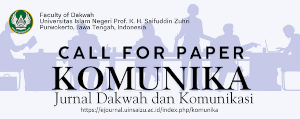PERAN ORANG TUA DALAM MEMBANGUN KEPRIBADIAN ANAK
DOI:
https://doi.org/10.24090/komunika.v6i1.342Keywords:
dakwah, methods of preaching in the family, children characterAbstract
One of parents’ roles in family life is delivering religious values. This can beapplied in the family in three methods, bilhikmah (wisely), bilmauidzhoh hasanah (withgood advice), and bilmujadalah (with exchange thoughts). These methods are applied inorder to form good character of children. In applying this method effectively andefficiently, parents as a performer da’i should apply ten guidance for da’i.The ten rules are: 1) parents should provide exemplary before preaching; 2) parentsshould have good impression; 3) parents should explain before giving someassignment/task; 4) parents have to apply some phases in giving tasks; 5) parents shouldfacilitate rather than complicate; 6) the principles should be given before the branch; 7)parents should motivate rather than threat; 8) parents should encourage rather than dictate;9)parents should educate rather than expose; 10) parents should emphasize students tofrom their teacher rather than from books.Downloads
Download data is not yet available.
Downloads
Issue
Section
Articles
License
Authors who publish with this journal agree to the following terms:
- Authors retain copyright and grant the journal right of first publication with the work simultaneously licensed under a Creative Commons Attribution-ShareAlike 4.0 International License that allows others to share the work with an acknowledgement of the work's authorship and initial publication in this journal.
- Authors are able to enter into separate, additional contractual arrangements for the non-exclusive distribution of the journal's published version of the work (e.g., post it to an institutional repository or publish it in a book), with an acknowledgement of its initial publication in this journal.
- Authors are permitted and encouraged to post their work online (e.g., in institutional repositories or on their website) prior to and during the submission process, as it can lead to productive exchanges, as well as earlier and greater citation of published work (See The Effect of Open Access).
























